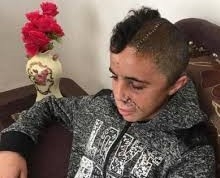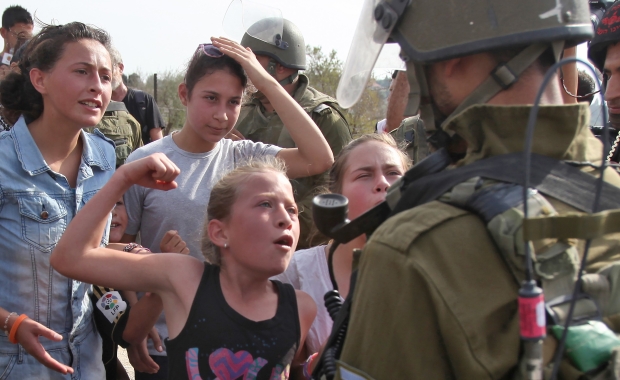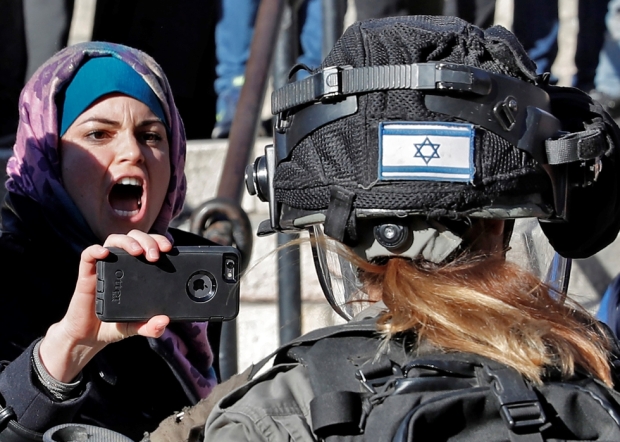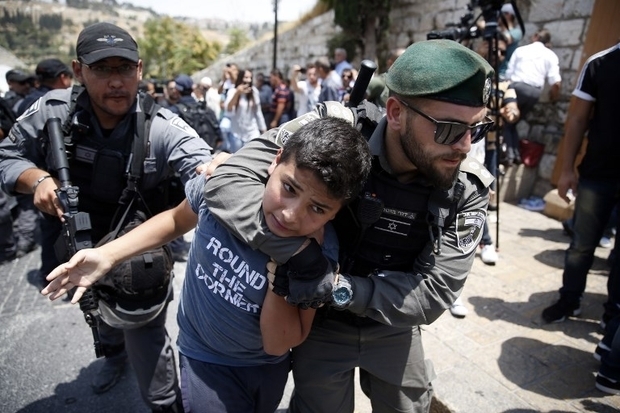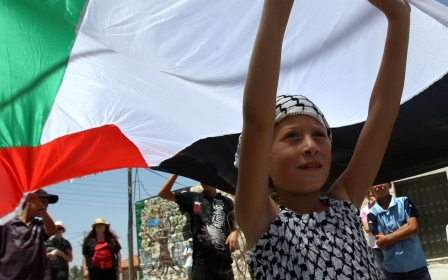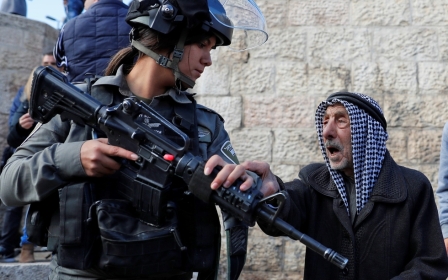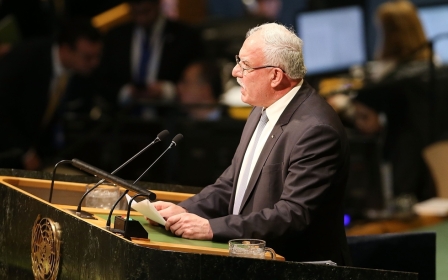There is only one reason why Ahed al-Tamimi remains in prison
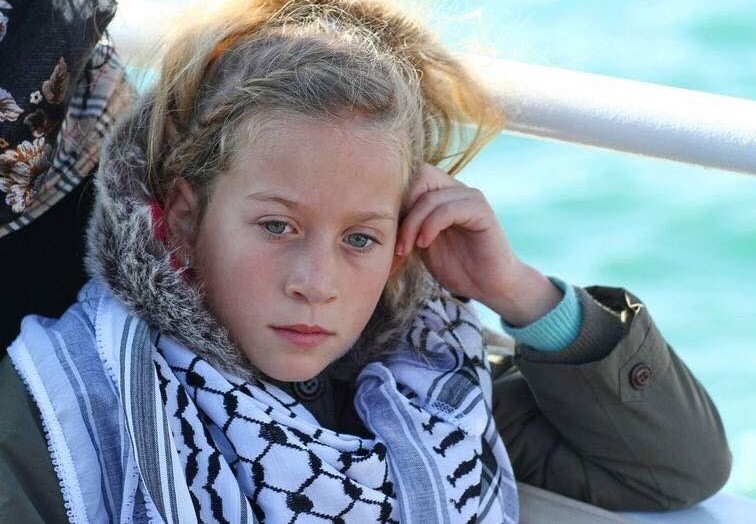
On 15 December, an Israeli army sniper shot 14-year-old Palestinian teen Mohammed al-Tamimi. The incident took place during the weekly demonstration in the village of Nabi Saleh where Israeli authorities have gradually stolen the land and water resources on behalf of the nearby settlement of Halamish.
Al Tamimi was severely wounded by a rubber bullet that entered his brain and caused severe injury. He was put into a medically induced coma and is expected to recover.
A report by NBC News on the shooting repeats a serious misconception commonly advanced by Israeli forces in justifying the firing of such ammunition at children and teenagers: rubber-coated bullets are commonly used to disperse crowds. While considered non-lethal, they nonetheless can be dangerous.
Rubber bullets are lethal. They routinely wound, maim and kill innocent Palestinian protesters. Accepting the Israeli perspective on this matter constitutes journalistic malpractice.
Can you imagine any other western democracy in which the army was charged with prosecuting children?
A veteran protester
After the shooting, the West Bank village erupted in anger and began throwing stones at the Israeli army, who attempted to put a stop to the unrest by patrolling at the site of a home where protesters were gathered. This aroused the anger of 16-year-old Ahed al-Tamimi, a veteran of many protests against Israeli forces.
She ran outside her home and confronted two Israeli soldiers demanding that they leave the family property. The army officers refused. At that point, Ahed escalated from demands that they leave to a physical confrontation.
She lunged at the soldiers, trying to slap and kick them. She did little damage and the soldiers essentially tried to ignore her.
There is only one reason for the soldiers' restraint. They were being videotaped. They knew that if they arrested her or retaliated it would be documented on film and the world would see. So they chose the path of least resistance.
However, their refusal to act aroused a hornet's nest of anger among Israelis, who saw "their boys" as being beaten down by a mere girl. It was humiliating, and the ultra-nationalist ruling coalition demanded punishment.
No Palestinian, let alone a girl, must be permitted to disrespect the might of the Israeli nation in such a fashion, they argued.
As a result, the Israeli army prepared a raid on the al-Tamimi home the next morning at 4am. Soldiers barged into her home, grabbed Ahed from her bed, put her in handcuffs, and hustled her to a waiting paddy wagon. They also stole the family's electronic devices including cell phones and computers, apparently hoping to document the "crime" Ahed had committed.
The girl's mother followed her to the police station in order to protect her daughter. Instead, she herself was arrested. That morning, the police dragged Ahed to court where they demanded the judge extend her imprisonment.
A regime of bullies
Bassem al-Tamimi, Ahed's father, came to court in order to support his daughter. He then was also arrested. This is the way a regime of bullies and mafiosi rule. They brook no opposition. If you resist, you will be made an example of so that other Palestinians don't get any "big ideas" into their heads to join the resistance.
Ahed's detention has been extended for a week by the settler military court because the judge determined she was likely to compromise the investigation of her alleged crimes.
Judge Lidor Drachman of the Judea region Juvenile Military Court said that while Ahed did not pose any danger, concerns that the teen would try to obstruct the investigation justified keeping her locked up until next Monday.
"Despite the provocative and outrageous behavior of the suspect, given the limited risk she poses in addition to her young age, I was prepared to release her into an alternative detention," wrote Drachman.
If Israeli women are inferior to Israeli men, then Palestinian women are even lower. They are the blacks of Israel
However, he continued, he had changed his mind after being supplied with evidence that she was a serial offender and that releasing her would compromise the investigation. "The confidential report submitted to the court indicates that…[she posed a] significant threat and would compromise the investigation.'"
There is only one reason she remains in prison. As punishment for her temerity. Clearly, this young girl cannot compromise any investigation. It's also worth noting that the Israeli army maintains its own juvenile court.
Can you imagine any other western democracy in which the army was charged with prosecuting children?
The missing context
The Israeli media also joined the chorus of abuse against the al-Tamimis. Israelis were so unnerved at the sight of a Palestinian teenager berating the cream of Israel's army that they belittled her by calling her "Shirley Temper", a derogatory reference to 30s child film-star Shirley Temple.
Former Israeli ambassador to the US and current MK Michael Oren implied in a tweet that Ahed's curly blond hair must mean that she wasn't really Palestinian or a true member of the family. He tweeted that it was doubtful the al-Tamimis were a "real family".
He added that the children, when they protested, wore American clothes, another racist claim that these Palestinians were trying to manipulate a Western audience to feel sympathy for their plight. What did Oren expect the kids to wear?
The offensive term "Pallywood" was also widely used, indicating that Israelis believe that Palestinians stage hoaxes to fool the world into sympathising with them. For the coup de grace, the Israeli legislator accused the al-Tamimis of paying their children to protest.
To be absolutely clear, this is fake news, charges with no basis in fact. Yet because Oren is a Knesset member and loyal Likudist mouthing the racist smears of his fellow citizens, this is rhetoric that resonates in Israel.
Rarely did the Israeli or foreign press note that the near-murder of Mohammed al Tamimi had preceded Ahed's physical resistance against the Israeli army patrol. The media conveyed a narrative that removed critical context which would permit a reader to understand the full picture and how events played out.
US media such as the Washington Post and the New York Times followed suit in using these racist terms in portraying the protest. They justified this by claiming they were merely reporting on the sentiment inside Israel. A wholly unconvincing argument.
The Post in particular displayed a picture purporting to show Ahed verbally confronting Israeli troops in an earlier protest. However, the girl who is arguing with the soldiers is not, in fact, Ahed. Though the latter is in the picture, she is not the one arguing. Such graphic mistakes refute the purpose of the image, which was to show Ahed's purported angry, confrontational style.
As if this wasn't bad enough, one of Israel's major newspaper columnists, Ben Caspit, wrote a horrifying story in Maariv in which he praised the soldiers for doing their best under trying circumstances. He showed no such sympathy for Ahed. In fact, he was quoted in an AP story saying: "In the case of the girls, we should exact a price at some other opportunity, in the dark, without witnesses and cameras."
Social media platforms lit up in outrage at this not so subtle call for rape and torture against a teenage girl. There were calls for Al Monitor, where Caspit's work is regularly published in English, to fire him.
I asked the management of Al Monitor whether they were reviewing this matter and whether Caspit's comment met the outlet's journalistic standards. They had not replied by the time this piece went to press.
Misogyny and occupation
These days the world has become more sensitive to the treatment of women in the workplace and in the media. That makes Caspit's comment even more glaring in its misogyny. But we shouldn't be surprised at this in the Israeli context.
As a society, Israel faces an epidemic of sexual harassment and violence against women. Police routinely disbelieve female victims and are loathe to prosecute such cases.
Though much of this may be attributed to general societal attitudes toward women, there is another important factor: Israel's occupation impacts the nation in ways both great and small.
The notion that Israel is a security-obsessed nation in which individuals must often sacrifice their rights on behalf of the greater whole, overwhelms the status of women. They become casualties of the national security state. Their advancement and rights are relegated to lesser status.
This is even more the case for Palestinian women. If Israeli women are inferior to Israeli men, then Palestinian women are even lower. They are the blacks of Israel. They are ripe for ridicule of just the sort I outlined above.
Israel’s heavy-handed approach, instead of quelling unrest, incited even more anger and violence. Protests broke out in Palestine/Israel since US President Donald Trump's decision on Jerusalem being the capital of Israel on 6 December. So far, 15 Palestinians have been killed by Israeli forces protesting against the Trump declaration.
According to the Palestine Red Crescent Society, nearly 3,600 Palestinians were injured during these protests, 729 of whom were wounded with rubber bullets and at least 192 by live rounds. The Palestinian Prisoners' Club said on Wednesday that since 6 December the Israeli army arrested 620 Palestinians - 170 of them were children and 12 are women.
The latest to die was 17 year-old Mohammed Sami al-Dadouh who was shot in the neck by Israeli troops in a Gaza protest at the border fence. The bullet severed his spinal cord and he died on Monday.
- Richard Silverstein writes the Tikun Olam blog, devoted to exposing the excesses of the Israeli national security state. His work has appeared in Haaretz, the Forward, the Seattle Times and the Los Angeles Times. He contributed to the essay collection devoted to the 2006 Lebanon war, A Time to Speak Out (Verso) and has another essay in the upcoming collection, Israel and Palestine: Alternate Perspectives on Statehood (Rowman & Littlefield).
The views expressed in this article belong to the author and do not necessarily reflect the editorial policy of Middle East Eye.
Photo: Ahed al-Tamimi's detention has been extended for a week by the settler military court because the judge determined that she was likely to compromise the investigation of her alleged crimes (Twitter)
Middle East Eye propose une couverture et une analyse indépendantes et incomparables du Moyen-Orient, de l’Afrique du Nord et d’autres régions du monde. Pour en savoir plus sur la reprise de ce contenu et les frais qui s’appliquent, veuillez remplir ce formulaire [en anglais]. Pour en savoir plus sur MEE, cliquez ici [en anglais].



